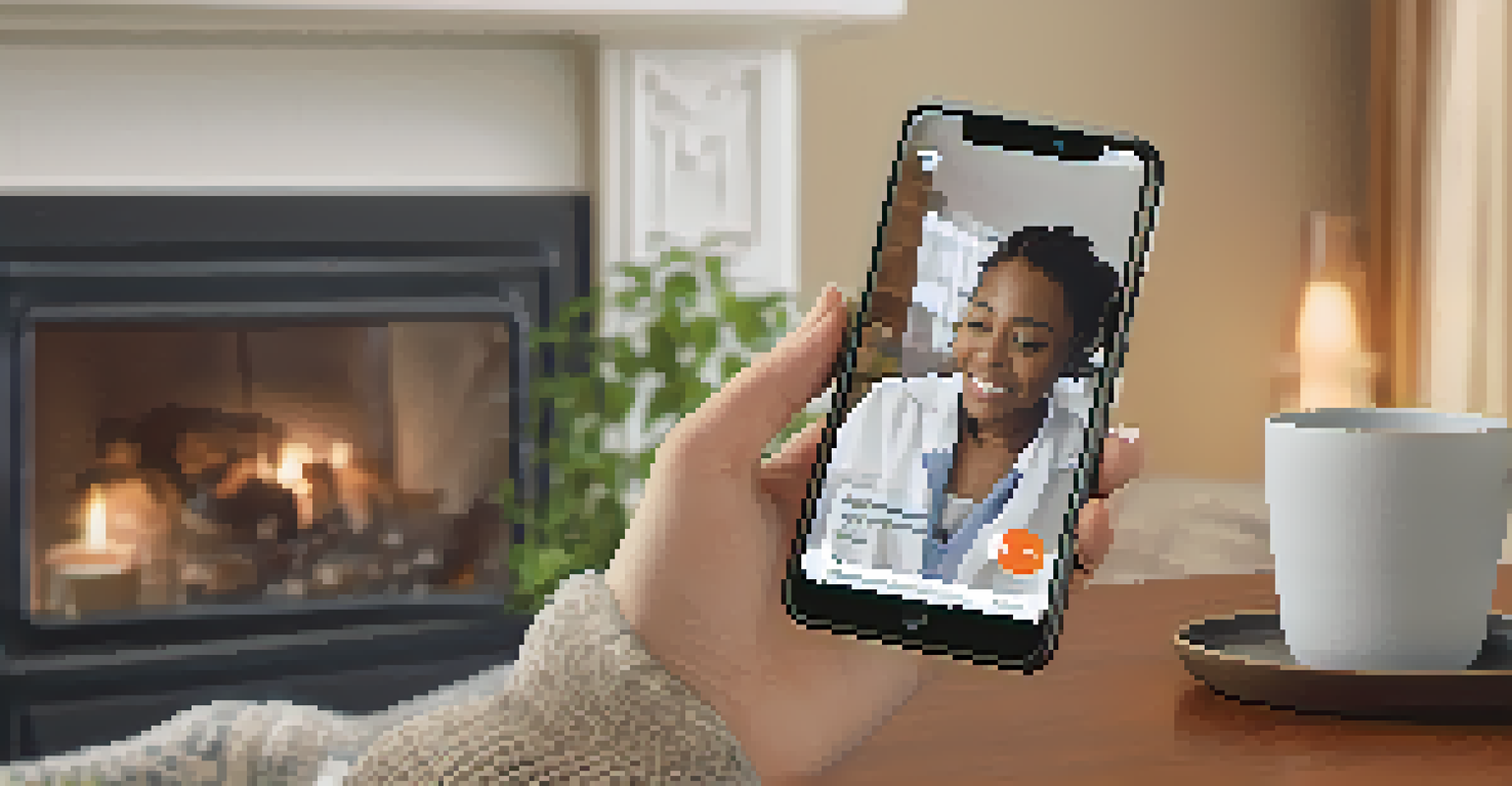Benefits of Telehealth for Patients in Addiction Recovery

Enhanced Accessibility for Patients in Recovery
One of the most significant benefits of telehealth is its ability to enhance accessibility for patients in addiction recovery. Many individuals face barriers such as transportation issues, mobility challenges, or living in remote areas. Telehealth addresses these obstacles by allowing patients to attend therapy sessions from the comfort of their homes, saving time and reducing stress.
The greatest discovery of my generation is that a human being can alter his life by altering his attitudes.
This increased accessibility means that more patients can receive the help they need without the added burden of travel. For example, someone living in a rural area might struggle to find a local support group, but with telehealth, they can connect with resources and professionals nationwide. The virtual nature of these services opens the door to a wider range of treatment options.
Moreover, this flexibility can help patients maintain their treatment schedules more consistently. With less time spent commuting, individuals can allocate more time to focus on their recovery, engage with support networks, and practice self-care.
Convenience and Flexibility in Treatment
Telehealth offers a level of convenience that traditional in-person visits often cannot match. Patients can schedule appointments that fit their busy lives, making it easier to incorporate therapy into their daily routines. This flexibility is particularly beneficial for those balancing work, family, and recovery commitments.

For instance, a working parent can arrange a virtual session during lunch breaks or after the kids have gone to bed. This adaptability not only reduces stress but also empowers patients to take charge of their recovery journey. The easier it is to attend sessions, the more likely individuals are to stay engaged in their treatment.
Telehealth Enhances Accessibility
Telehealth removes barriers to addiction recovery, allowing patients to attend therapy from home, regardless of location.
Additionally, patients can choose the environment in which they feel most comfortable for their sessions. Whether it’s a quiet room at home or a favorite café, this personalization can lead to more productive conversations and a stronger therapeutic alliance.
Increased Privacy and Reduced Stigma
For many individuals in addiction recovery, privacy is a crucial concern. Telehealth offers a discreet way to access treatment without the fear of encountering someone they know at a clinic. This sense of anonymity can encourage more people to seek help, reducing the stigma often associated with addiction.
Recovery is not a race. You don’t have to feel guilty if it takes you longer than you thought it would.
Imagine being able to connect with a therapist or support group without the anxiety of facing judgment from others. This aspect of telehealth can be a game-changer for those who might otherwise shy away from seeking assistance due to fear of stigma. It creates a safe space for open discussions about recovery and personal challenges.
Moreover, this increased privacy can lead to deeper, more honest conversations. Patients may feel more at ease discussing sensitive topics when they’re in a familiar, private setting, ultimately leading to more effective therapy and support.
Access to Specialized Care from Anywhere
Telehealth breaks down geographical barriers, allowing patients access to specialized care that may not be available locally. This is particularly important for those with unique needs or complex cases requiring expert attention. Patients can connect with therapists, counselors, and support groups that focus specifically on addiction recovery.
For example, someone struggling with a specific substance may benefit from speaking with a professional who has a deep understanding of that addiction. With telehealth, they can find the right expert without being limited by their location. This access to specialized care can significantly improve treatment outcomes.
Convenient and Flexible Treatment
Patients can schedule therapy sessions around their busy lives, making it easier to stay engaged in their recovery.
Additionally, patients can switch providers easily if they feel their current treatment isn’t meeting their needs. This flexibility ensures that they can find the right fit for their recovery journey without the hassle of physical relocation.
Support for Co-Occurring Disorders
Many individuals in addiction recovery also deal with co-occurring mental health disorders, such as anxiety or depression. Telehealth can be particularly beneficial for these patients, as it allows for integrated care that addresses both addiction and mental health issues simultaneously. This holistic approach is vital for effective recovery.
By offering both therapy and support groups through telehealth, patients can receive comprehensive treatment tailored to their specific needs. For instance, someone struggling with substance abuse and anxiety can attend therapy sessions that address both issues concurrently, fostering a more effective recovery plan.
Moreover, mental health professionals can collaborate more easily through telehealth, sharing insights and strategies to support their patients. This coordinated care ensures that all aspects of a patient’s well-being are being considered, leading to better outcomes.
Strengthening Support Networks Virtually
Telehealth also enables individuals in recovery to strengthen their support networks through virtual connections. Online support groups and forums provide a platform for sharing experiences and encouragement, helping patients feel less isolated. This community aspect is crucial for long-term recovery.
For example, a patient may participate in a virtual support group that meets weekly, allowing them to connect with others facing similar challenges. These interactions foster a sense of belonging and accountability, which are essential components of successful recovery. Patients often find motivation and inspiration from their peers in these settings.
Increased Privacy Reduces Stigma
Telehealth provides a discreet way to seek treatment, encouraging more individuals to access support without fear of judgment.
Additionally, family members can join virtual sessions to learn how to support their loved ones better. This inclusion allows for a more comprehensive support system, ensuring that recovery is a collaborative effort.
Cost-Effectiveness of Telehealth Services
Telehealth can also be more cost-effective than traditional in-person treatment. Many patients find that virtual appointments reduce costs associated with travel, childcare, and time off work. This financial relief can lower the barriers to accessing necessary care, making recovery more attainable.
Furthermore, many insurance plans now cover telehealth services, often at the same rate as in-person visits. This shift in policy reflects the growing recognition of telehealth as a legitimate and effective form of treatment. Patients can therefore receive quality care without worrying about exorbitant costs.

As a result, individuals can allocate their resources toward other essential recovery needs, like medication, support groups, or self-care activities. This financial flexibility can significantly enhance their overall recovery experience.